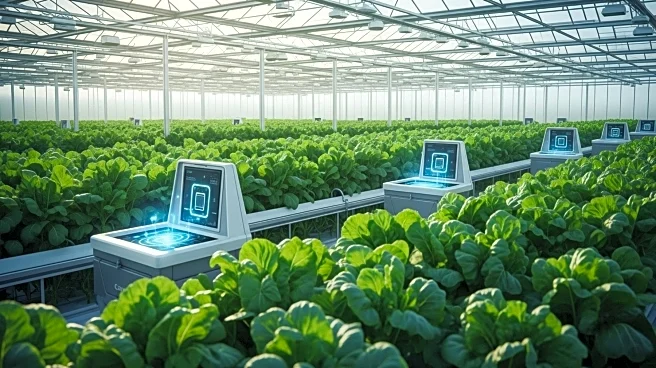What is the story about?
What's Happening?
The global sustainable agriculture market is anticipated to grow significantly, reaching a valuation of $33.88 billion by 2032, according to DataM Intelligence. This growth is driven by technological advancements, supportive government policies, and increasing consumer demand for eco-friendly and organic products. The market was valued at $15.46 billion in 2024 and is expected to grow at a compound annual growth rate (CAGR) of 10.3% from 2025 to 2032. Asia-Pacific currently leads the market, benefiting from large agricultural economies like India and China, supported by government initiatives promoting soil health, organic certification, and agri-tech adoption. The biopesticides segment is experiencing significant growth as farmers shift away from chemical pesticides, supported by regulatory frameworks like the EU Sustainable Use Directive and U.S. EPA initiatives.
Why It's Important?
The expansion of the sustainable agriculture market is crucial for addressing global food security and environmental challenges. As consumer preferences shift towards organic and eco-friendly products, the market provides opportunities for farmers and companies to adopt sustainable practices. This growth supports the reduction of environmental damage and promotes biodiversity through methods like precision farming, which integrates AI, drones, and data analytics to optimize resources and improve yields. The U.S. organic farmland expansion to 4.9 million acres in 2021 reflects rising organic demand, positioning North America as a fast-growing region in the market. The adoption of sustainable agriculture practices is essential for long-term soil fertility and balanced ecosystems, contributing to climate-resilient food systems.
What's Next?
The sustainable agriculture market is expected to continue its growth trajectory, with government incentives and technological collaborations presenting strong opportunities. The demand for biopesticides, biofertilizers, and regenerative solutions is likely to increase, offering lucrative avenues for market participants. The expansion of sustainable agriculture certification and the export potential of organic produce are anticipated to drive further market growth. As digital infrastructure and consumer preferences evolve, North America is poised to accelerate adoption through investments in farm digitalization, vertical farming, and hydroponics.
Beyond the Headlines
The shift towards sustainable agriculture has deeper implications for global food security and environmental stewardship. By reducing reliance on chemical pesticides and promoting eco-friendly practices, the market supports biodiversity and long-term soil health. The integration of AI and digital platforms in farming enhances productivity while minimizing resource use, contributing to climate-resilient agricultural systems. As governments and organizations invest in sustainable practices, the market is positioned as a cornerstone for achieving global food security and addressing climate change challenges.

















